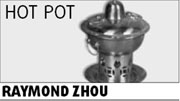Prestige pitch is a little rich
By Raymond Zhou ( China Daily ) Updated: 2007-05-23 15:23:12If you've got it, flaunt it. In China, "it" more often than not refers to wealth. Take a look at the giant outdoor billboards, and you'd be forgiven to believe that China is populated by 1.3 billion Bill Gates or mini-Gates.
There is nothing new about the current controversy about advertisers catering to the so-called "super-rich". We Chinese are so obsessed with the lifestyles of the rich and famous that the ultimate symbol of success is to live like them.
 A decade ago, I was lured to make a television sitcom by a real estate developer. He wanted the show to promote his project in Beijing's northern suburb. You can call it a product tie-in because he proposed to title the show Wealthy Village.
A decade ago, I was lured to make a television sitcom by a real estate developer. He wanted the show to promote his project in Beijing's northern suburb. You can call it a product tie-in because he proposed to title the show Wealthy Village.
I was driven there for "location scouting". Surprisingly, it was row after row of townhouses, shoddily built and without any character or style. I doubted the genuinely rich would be interested, but those who wanted to be taken as one might have been impressed. In China, the eternal paradox is, the super rich tend to keep a low profile while those who have made wealth show -off into a low-brow art are usually miles away from the league of the super rich.
Thomas Friedman says that "middle class" is a state of mind. In China, affluence can also be a state of mind, especially when aided by such conspicuous displays as name-brand automobiles and clothes.
However, you shouldn't blame the wealth aspirants and new achievers. They are not called the "nouveaux riches" for nothing. Poverty could be so traumatic that one is scarred for life and only by bathing oneself in the ointment of perceived opulence would he be able to remove the odor of the bad old days.
That is a dream come true for vendors who fatten their profit margins by positioning even run-of-the-mill products and services at high-end. Come to think of it, if a fast-food restaurant promoted itself as the Western equivalent of a noodle shop or porridge stall, it wouldn't be able to suggest that eating a lot of burgers would somehow lead to Harvard success and billionaire happiness.
The more a business is known for championing lifestyle, the more it can charge a premium to the relentlessly upward mobile. To make it easier, lifestyle does not necessarily equal good taste.
There is a similarity between the Chinese fascination with money and the American fixation on size. In America, "small" for a piece of clothing is labeled "large", "medium" becomes "extra large", and "large" is enlarged to "extra extra large". We should perhaps adopt a similar strategy: A condo of 50 square meters is for the "rich", one of 100 for the super rich, and one of 200 for the super duper rich, and so on.
I suggest we outlaw the use of "affordable" in advertising. In its place, we should use "exorbitant".
For example, "our product is so exorbitant in pricing that it will take ten years of your income". If the consumer can buy it with two years of his income, he'd think he is five times better-heeled than the national average.
Middle class? Who wants to be stuck in the middle?
(China Daily 05/23/2007 page20)
|
|
|
|
|
|
|
|


























 Raymond Zhou:
Raymond Zhou: Pauline D Loh:
Pauline D Loh: Hot Pot
Hot Pot Eco China
Eco China China Dream
China Dream China Face
China Face






